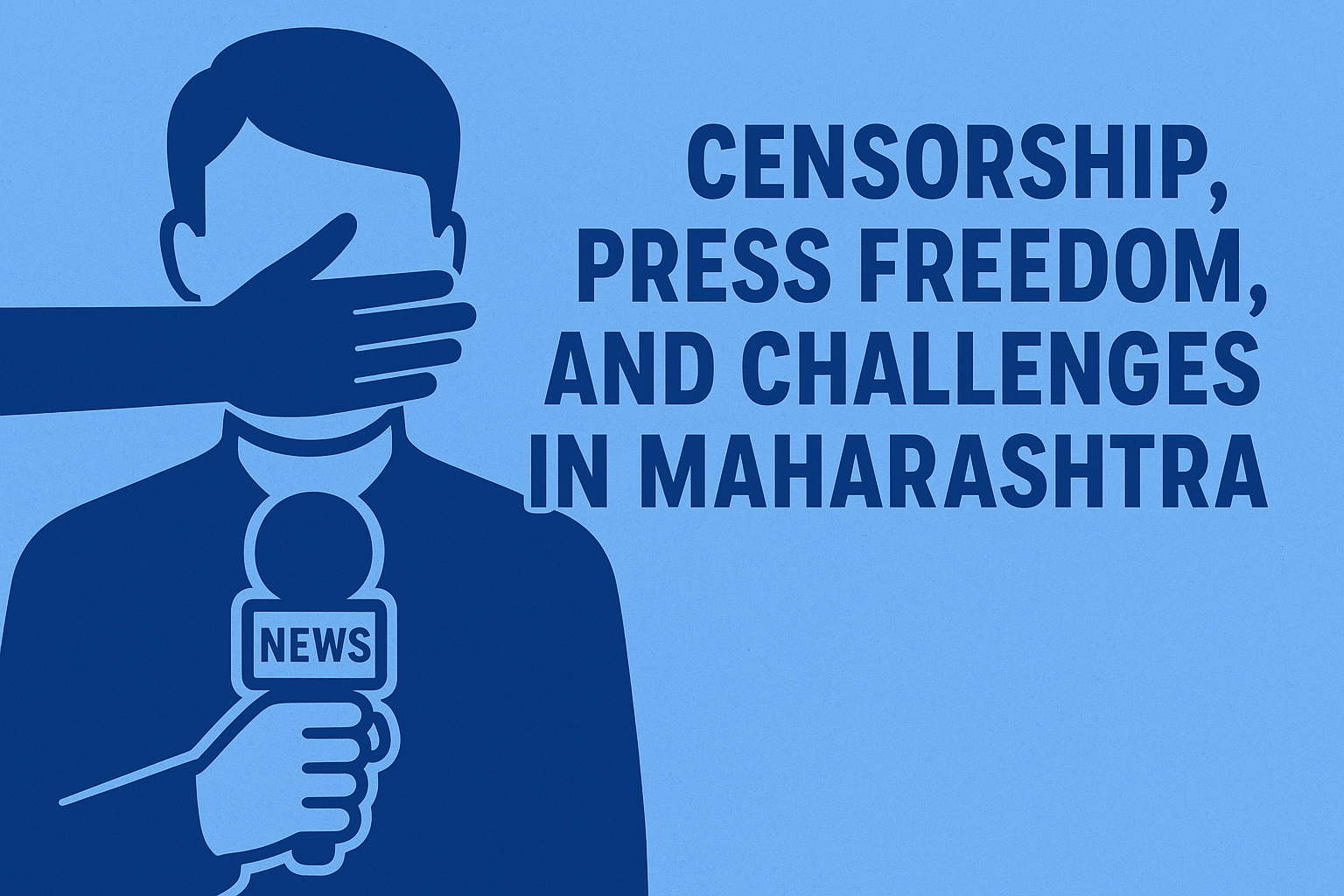🛑 Censorship, Press Freedom, and Challenges in Maharashtra

🛑 Censorship, Press Freedom, and Challenges in Maharashtra
Journalism Under Pressure in a Free But Fragile Environment
Maharashtra, known for its vibrant media culture and powerful legacy in journalism, generally upholds freedom of the press. Cities like Mumbai and Pune are major media hubs where national and regional outlets operate with relative independence. However, this freedom is not absolute. Journalists—especially those working in rural or sensitive beats—face invisible walls, external pressure, and real threats while doing their job.
🧾 What Is Press Freedom?
Press freedom means journalists can report facts without fear, censorship, or political control. It’s an essential pillar of democracy. In Maharashtra, while urban journalists often enjoy legal protections and institutional backing, those in smaller districts and rural areas are frequently exposed to pressures that limit their ability to report freely.
⚖️ Legal Threats: SLAPP Lawsuits & Defamation Cases
One of the most common tools to silence journalists is the SLAPP lawsuit—Strategic Lawsuits Against Public Participation. These are high-cost, time-consuming legal cases filed by powerful individuals or corporations to intimidate journalists, regardless of the truth in their reports.
-
These lawsuits do not aim to win, but to harass and financially drain the reporter or media house.
-
Investigative journalists covering corruption, scams, or powerful politicians often become targets.
🚨 Police Pressure and Surveillance
Journalists reporting on sensitive topics—such as communal violence, police excesses, or administrative corruption—sometimes face subtle or direct pressure from law enforcement agencies:
-
Calls for "verification" of credentials
-
Requests to reveal sources
-
Digital surveillance on phones and emails
-
In some cases, FIRs (First Information Reports) are filed under various charges to create legal obstacles
While these incidents are more common in high-stakes investigations, even local beat reporters have faced them in areas like Nagpur, Aurangabad, and Nashik.
⚠️ Threats from Political and Religious Groups
Journalists who report critically on politicians, religious groups, or caste leaders often receive:
-
Threatening calls or messages
-
Social media trolling and abuse
-
Organized boycott or protests against the media outlet
-
In some cases, physical violence or attempts to vandalize media offices
For example, reporters covering communal issues, caste atrocities, or land disputes have been labeled "anti-national" or "biased" by fringe groups—sometimes with tacit support from local power centers.
🌐 Limited Access to RTI in Rural Maharashtra
The Right to Information (RTI) Act is a powerful tool for journalists. However, in rural parts of Maharashtra:
-
RTI responses are delayed or denied, especially when questions target land records, mining clearances, forest rights, or local funds.
-
Bureaucrats often claim files are “missing” or ask for physical visits despite online systems being in place.
-
Journalists from Gadchiroli, Chandrapur, Nandurbar, and Melghat often report that RTI information is either censored or intentionally vague, making it difficult to publish evidence-based reports.
🧑🌾 Rural Reporters: The Most Vulnerable
In urban centers, journalists may have access to lawyers, editors, or professional bodies that protect them. But in rural and tribal belts, the situation is far more fragile.
Key Challenges Faced by Rural Journalists:
-
No legal support or insurance
-
Dependence on local police and politicians for protection, which compromises neutrality
-
Lack of media training, making them more exposed to legal and personal risks
-
Pressure from local power brokers, such as land mafias, mining contractors, and caste-based political lobbies
Journalists reporting on land grabs, illegal mining, forest encroachments, or Dalit atrocities are often the only voices speaking out—and that makes them targets.
🔥 Real Cases That Raise Concern
-
In Gadchiroli, several journalists reporting on Naxalite areas and tribal rights have been harassed or threatened.
-
In Chandrapur, a reporter covering illegal coal mining was attacked and his equipment destroyed.
-
In Marathwada, journalists covering water theft and tanker mafias during drought seasons faced threats from criminal elements with political backing.
These examples reflect a larger pattern—freedom exists on paper, but journalism on the ground often comes at a personal cost.
🏁 Way Forward: How to Protect Press Freedom
To ensure genuine press freedom across Maharashtra, the following steps are essential:
-
Strengthen legal aid for journalists, especially freelancers and rural reporters.
-
Create a journalist protection law, similar to what some states have proposed.
-
Improve RTI transparency and timelines, particularly for rural applicants.
-
Support journalist welfare schemes—insurance, training, mental health support.
-
Empower independent bodies like the Bharat Media Association (BMA) to monitor threats, support affected journalists, and advocate for freedom of speech.
📢 Final Words: A Free Press Is a Strong Maharashtra
Maharashtra cannot afford to lose its tradition of bold, ethical, and people-centric journalism. While the state has media giants and rich journalistic heritage, the true test lies in protecting the small-town reporter, the tribal correspondent, and the independent voice who risks everything to tell the truth.
Censorship and fear must not replace curiosity and courage.
- Goa
- Jammu & Kashmir
- Punjab
- Uttar Pradesh
- Uttarkhand
- Andaman & Nikobar Islands
- Andhra Pradesh
- Karnataka
- Kerala
- Lakshdweep
- Puducherry
- Tamilnadu
- Telangana
- Dadra &Nager Haveli, Daman &Diu
- Himachal Pradesh
- Gujarat
- Madhya Pradesh
- Maharashtra
- Rajasthan
- Legal
- Life Style
- Music
- Prop News
- Sports
- Technology
- SURAKSHA
- Education
- International
- Haryana
- BMA
- Bharat
- Business
- Entertainment
- Fashion & Beauty
- Health & Fitness
- Arunachal Pradesh
- Assam
- Bihar
- Chattisgarh
- Jharkhand
- Ladakh
- Manipur
- Meghalaya
- Mizoram
- Nagaland
- Odisha
- Sikkim
- Tripura
- West Bengal
- Chandigarh
- Delhi - NCR
- Bharat Aawaz
- IINNSIDE
- Business EDGE
- Media Academy



